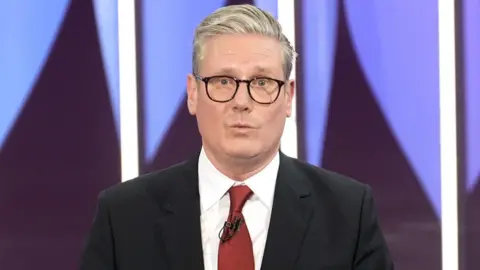ARTICLE AD BOX

 PA Media
PA Media
Labour Leader Sir Keir Starmer has said his predecessor Jeremy Corbyn would have been a "better prime minister" than Boris Johnson.
During a special edition of BBC's Question Time, Sir Keir was pushed on his previous support for Mr Corbyn, who he eventually expelled from the Labour party following a row over antisemitism and is now standing as an independent.
During the 2019 election, Sir Keir said Mr Corbyn would make a “great prime minister" but when asked about it last week said he had been “certain” Labour would lose that election.
Asked why voters should trust him – and why had praised his predecessor in 2019 -Sir Keir said Mr Corbyn "would be a better prime minister" than "what we got - Boris Johnson, a man who made massive promises and didn't keep them".
With two weeks to go until election day, Sir Keir was one of four political leader taking turns being interrogated by a BBC audience in York.
Amid occasional boos from the audience, Prime Minister Rishi Sunak was put under pressure to defended the Conservatives' 14-year record and his pledge to introduce national service if he wins on 4 July.
The prime minister also told the audience he was "incredibly angry" at allegations that Tory insiders were betting on the election date - and promised to "boot out" anyone found to have broken rules.
On the NHS, the Mr Sunak admitted "we haven't made as much progress as I would've liked" on waiting lists - but insisted record amounts were being spent on the NHS, a claim he invited BBC Verify to check.
He also repeated his willingness to leave the European Court of Human Rights (ECHR) - if it was a choice between national security and a "foreign court". Some applauded his stance, while others cried "shame".


The leaders of the two main political parties appeared to struggle at points as the audience pushed them to explain how they would fund major policies on housing and defence.
Quizzed about his national service policy, Mr Sunak insisted the insisted the military route was optional, despite the proposed scheme being compulsory.
When asked about what sanctions people could face for not taking part, Mr Sunak pointed to "access to finance" among other examples.
Asked if this meant taking away people's bank cards, he laughed, and said: "There's lot of different models around Europe."
Sir Keir promised to pass legislation to introduce rent controls to cap annual rent increases - ensuring they are no higher than inflation.
On migration, the Labour leader said he wanted to bring the numbers "down significantly", but refused to put a number on it, despite being asked how it was then possible to staff public services.
And on NHS waiting lists - a big topic during the interviews - Sir Keir said that over course of Parliament, a Labour government would get them down and clear the backlog entirely.
Liberal Democrat leader Sir Ed Davey admitted he was “not proud” of aspects of his time as a minister in the coalition government his party formed with the Conservatives in 2010.
The Lib Dems’ U-turn on student tuition fees had led to a loss of trust in the party that had been “very scarring”, he said.
He was also asked why he did not do more to help wrongly-convicted subpostmasters when he was the Post Office minister and for initially refusing to meet campaigner Alan Bates in 2010.
He said he should have seen through the “lies” told to him by the Post Office, adding he hoped "people go to prison" over "the biggest miscarriage of justice in our country's history".
He also defended what an audience member called his “horseplay” on the election campaign trail, saying it was designed to draw attention to party’s policies on serious issues such as mental health and sewage in rivers.
SNP leader John Swinney suggested he would prefer Sir Keir as prime minister over Mr Sunak.
Asked by an audience member which of the two main party leaders he wanted to see in Downing Street, he said: "I think the Conservative government has been a total disaster and a calamity. So it cannot be out of office quick enough in my view.”
Mr Swinney also highlighted the importance of Scottish independence and of rejoining the EU to his party's domestic agenda.
He also faced tough questions over the turmoil and allegations of corruption that have beset his party in recent months, conceding that he had taken over as leader six weeks ago “at a difficult time”.
Asked why the SNP had backtracked on its opposition to new oil and gas licences, Mr Swinney said any new licences would be assessed on a case-by-case basis and would have to be "compatible with our objectives on climate change".

 6 months ago
25
6 months ago
25








 English (US) ·
English (US) ·